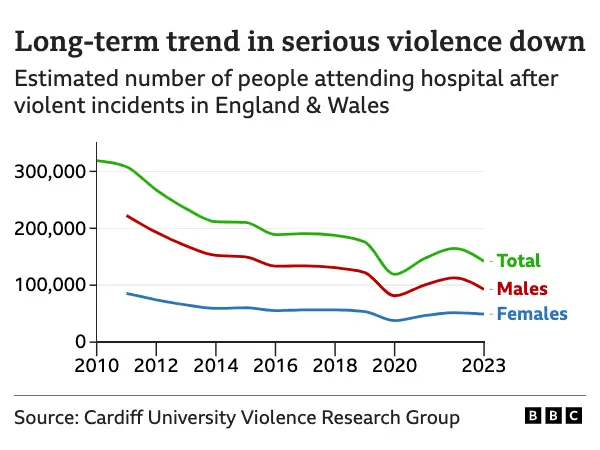I checked the demographic figures, and England's population is up 6.6% in the 2010s (the period for which the prison population is roughly flat), with Wales' much smaller population up by a bit over 1%. To me that suggests that if the prison population figures haven't really changed, and the crime rate was expected to remain the same, the government probably should have built a few more prisons to account for proportional increases in crime due to population growth. And that there wasn't much planning for the contingency of potential increases in crime.
Figures for 2023 show the level of violence at its lowest since the Covid lockdowns of 2020.

www.bbc.co.uk
I'm always skeptical of statistics that compare to years after 2019, since so much went outside of normal bounds in 2020 and 2021. But there was a chart in that article that went significantly farther back:
So, the number of people who require hospitalization after violent crime has fallen by roughly 50% since 2010. Which is pretty significant. That isn't all crime of course, but is one category of serious crime that seems to have fallen significantly in the past 14 years.
In the interested of clarity, is the "400% more" for the USA compared to England, or France/Spain, or Germany?
I believe that is USA compared to England. But that is my reading of the post.
You have drastically overestimated something here lol
The percent of CIvFanatics who read British news outlets? Eh, probably. But it's still one of the largest demographics here.
----
Find the most up-to-date statistics about crime in the United Kingdom
[/URL]
www.statista.com
Quoting the summary:
Between 2003/04 and 2013/14 crime levels fell across England and Wales, from just over six million offences to a low of around four million. The trend was reversed after this point with significant yearly increases after 2013/14, leading to a peak of offences in the most recent year [
6.74 million - Quintillus].
The sharp increase in crimes in recent years which came after significant reductions almost certainly has multiple causes, but one of the main factors is likely the cuts to public services imposed across the UK when the government was implementing austerity measures. Crime figures began to increase just as
funding for the police hit a low of 16.35 billion British pounds in 2013/14, with funding not increasing by any significant amount until 2017/18. One of the main consequences of these spending cuts was a reduction in the number of
police officers after 2010.
While overall crime figures have almost reached levels not seen since the early 2000s, the
number of homicides in England and Wales in 2022/23 was 602, compared with over 1,000 in 2002/03. During the same time period, the
homicide rate fell from 20 per million people, to 10.1
This text provides general information. Statista assumes no liability for the information given being complete or correct.
Have to love the "we make no guarantees that this is accurate, and don't provide sources" nature of Statista - not saying it isn't correct, but it's always my last resort when doing statistical research for that reason. Usually there is a government or NGO report somewhere that backs up the data, but Statista copies the data without public citation, puts the details (93% of their statistics according to their own website) and source behind a paywall, and makes it more searchable. Which I mainly find distasteful because so much of their data
is publicly available elsewhere, and it becomes harder to find from free, official sources when Statista dominates Google.
But personal not-a-fan-of-Statista aside, if that is accurate, it shows more of a mixed picture. The BBC article that Gorbles cited suggests perhaps the Tories did a good job reducing violent crime, but this data suggests that Tory policies lead to an increase in overall crime since 2014, particularly in the more recent Cameron, May, Johnson, Truss, and Sunak administrations (and doesn't give enough detail to say how much of the 2003 - 2014 decrease was under Labour versus Conservative). With speculation that austerity measures and a subsequent lack of deterrence/enforcement contributed to increasing crime rates, which is a classic tough-on-crime argument for why not to decrease police funding.
It doesn't necessarily mesh with uppi's chart; notably there is no decline notable in that chart from 2003 to 2014, but rather increases in incarceration rates despite the alleged fall in crime. Not all crimes come with the same sentence, but it does muddy the waters a bit.
----
Hmmm, maybe there is informative data in that Office for National Statistics link that Gorbles posted. Wouldn't be surprised if that's where Statista pulled their data from, I've seen the equivalent for the U.S. and Spain. But yes, it would require digging into the website to find... oh, there is one summary chart that's useful:
Note that this is from the Community Survey for England and Wales, and is an estimate of the actual number of crimes committed, including those not reported to police. In other words, when asked in interviews if they have observed or been victims of crime, the response has tended towards lower crime rates since 1995 or so. Hence why the numbers are higher than the total number of offences, it's not always worth the trouble of reporting minor crimes.






